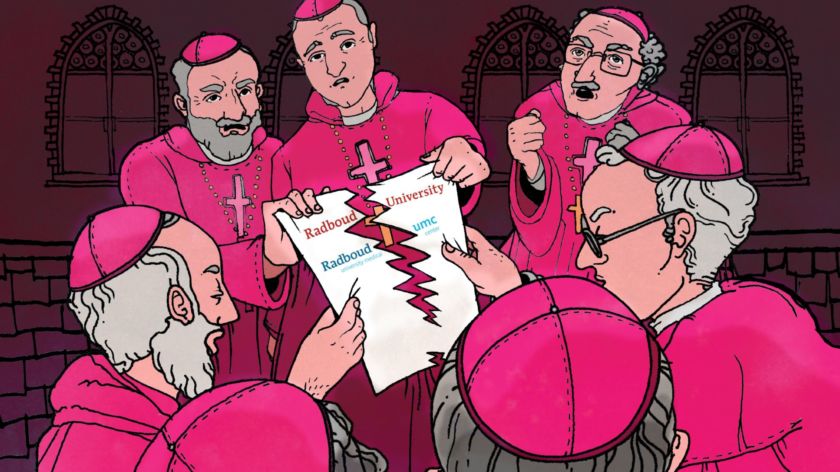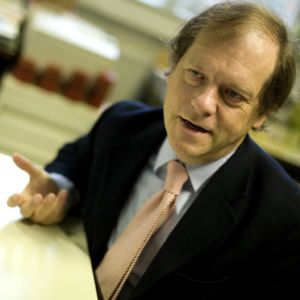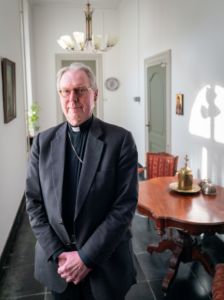Will Radboud University become Catholic again? ‘Unlikely’
-
 Illustratie: Ivana Smudja
Illustratie: Ivana Smudja
One year age the Dutch episcopal conference decided that the Radboud University and the Radboudumc would no longer be Catholic institutions. Two people lodged appeals against this decision. Their appeals are currently under consideration at the Vatican. It is unknown when a ruling will be made.
The Radboud University and the Radboudumc are no longer Catholic institutions. This was decided by the Dutch episcopal conference exactly one year ago on October 20th, 2020 (see insert). That decision could have been appealed in writing within ten days, but not with your everyday court; after all, the Catholic church is not subject to Dutch law, but rather canon (church) law.
That is why a request for revocation or review had to be submitted to the episcopal conference itself. Neither Radboud University nor the Radboudumc opted to start the appeal procedure.
Rome
However, two private individuals did lodge appeals against the episcopal conference’s decision. Suzan Daalman, Secretary General of the episcopal conference, can’t disclose whether the individuals are students or employees of Radboud University, for privacy reasons.
After the Cross
A year ago, Radboud University lost the predicate ‘Catholic.’ What does that mean? What has changed since then? And where are we headed from here? Vox will be publishing a series of articles to answer these questions.
What is known is that the episcopal conference did not handle the complaints itself, but rather sent them through to the Congregation for Catholic Education in Rome. That is because the Vatican Ministry of Education will be serving as a higher appeal body for this case. ‘The appeals are in Rome, and we don’t know when they will be processed’, according to a spokesperson for the episcopal conference.
While it is unknown when a ruling will be made, the complaints procedure is known. This procedure is described in the codex of canon law, explains Belgian church attorney Rik Torfs. He says ‘the congregation will look into both the legality and the expediency of the decision. In other words: was the decision lawful, and was it a smart one to make?’
According to Torf, those in the Vatican will wonder whether or not the two complaints are sufficiently authoritative. ‘The moniker ‘Catholic’ was not taken away from those two individuals, but from Radboud University and the Radboudumc’, says the former rector of the currently still Catholic KU Leuven. ‘And neither of the two institutions made an appeal.’
Apostolic Signatura
There is no known deadline for the ruling by the Congregation for Catholic Education. But it is possible that members of the Congregation will discuss the Nijmegen-matter with the Dutch bishops in January of 2022, during the so-called quinquennial visit ad limina. During this visit to the Vatican, held every five years, the Dutch bishops will have to report to the Pope on the state of their dioceses.
‘We will be visiting all Congregations of the Catholic Church for an entire week’, according to bishop Gerard de Korte. Until recently he was authorized by the Church for all contact with Radboud University as ordinarius loci, along with several other bishops. ‘It is almost unimaginable that we won’t be discussing Radboud University in Rome.’
Eventually the Congregation will have to make a decision regarding the two complaints. Quote Torfs: ‘Theoretically, the two individuals could appeal that decision as well. They can do this with the second part of the Apostolic Signatura: this is the highest judicial authority of the Vatican, which is only concerned with the legality of decisions.
Unlikely
Still, chances are slim that the Radboud University’s Catholic status will be reinstated because of the new complaints. ‘Formally, the ‘Catholic’ label would have to be re-instated by the relevant authority’, according to Torfs. ‘In this case that would be the Dutch episcopal conference. They could suddenly decide to do this. But in my opinion that is unlikely; universities don’t usually have a religious atmosphere, but rather a neo-scientistic one.’
Bishop Gerard de Korte expresses a similar sentiment. ‘Theoretically, the decree could be suspended, but I don’t know what the implications would be. Then you would be in a situation where you’re unsure what that means. Does that mean we’d have to renew our consultation process? And if so, with whom?’
There is a different option for regaining the Catholic status, namely that the episcopal conference withdraws its own decree; De Korte can’t see this happening in the short term. ‘But the future is open.’
However, that does not mean that the Radboud University is no longer allowed to call itself Catholic, according to Torfs. ‘A lot of Radboud University employees that I’m familiar with, still consider toe university to be Catholic. You can be a Catholic university without having the right to call yourself Catholic.
Radboud University no longer Catholic
On the 20th of October 2020, the Dutch episcopal conference removed the designation ‘Catholic’ from the Radboud University and the Radboudumc. After a long drag-out fight with the supervisor of both institutions, the Stichting Katholieke Universiteit (SKU), they sent a registered letter with their decree to Nijmegen. The message: You are no longer Catholic.
This has two tangible consequences. First of all, it means that both institutions are no longer subject to the Ex Corde Ecclesiae, an apostolic constitution of the Vatican that Catholic universities must adhere to. Among other things, this legal document states that any research done at one of these universities must include a theological perspective, and students must be taught to be proper Christians.
Secondly, the supervisors of the SKU will no longer be appointed by the Dutch episcopal conference. That is because those supervisors were not only concerned with the University’s governance and finances, but also with matters concerning the Catholic identity. At the time, the bishops rejected a significant number of candidate-supervisors on the grounds that they didn’t consider them to be Catholic enough.
The bishops’ formal approval is no longer required for candidate-supervisors. Not only that, the SKU doesn’t even exist anymore; the administrative split between Radboud University and the Radboudumc led to the introduction of two separate supervisory boards.





